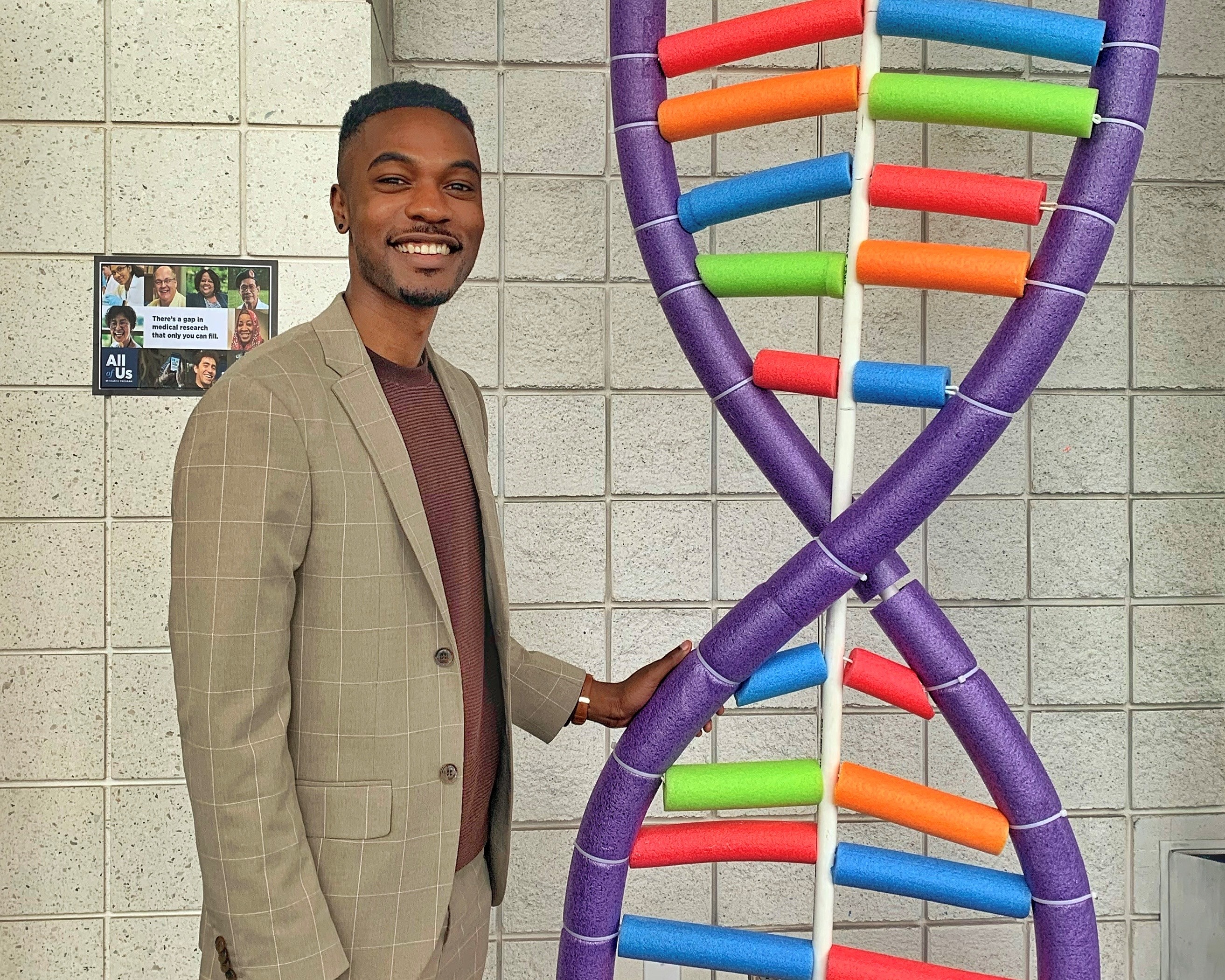Genetics alumnus finds early career support through national fellowship
Camerun Washington, MS’19, earns spot in first fellowship cohort

Genetic counseling graduate Camerun Washington sees a growing thirst for knowledge about genetics among the public, and he's now poised to grow his own skills to meet the need now that he's been named 1 of 10 Genomics and Public Service Fellows — and one of just three graduate-level fellows — selected by the American Society of Human Genetics and the National Human Genome Research Institute for its 2024-26 term. (Contributed photo)
From his vantage point as a clinical genetic counselor, Camerun Washington, MS’19 (HGEN), sees a growing thirst for knowledge about genetics. From those with a family history to others who want to maintain wellness, they’re eager to learn.
Washington expects to grow his own skills to meet those needs after being named a genetics education and engagement fellow earlier this year. He is 1 of 10 Genomics and Public Service Fellows — and one of just three graduate-level fellows — selected by the American Society of Human Genetics and the National Human Genome Research Institute for a 2024-26 term.
“When I got that email, I was over the moon and had very happy tears,” Washington said. “It solidified a dream that had finally come true for me.”
A need for knowledge
Washington’s dream began in Summerville, South Carolina, where he petitioned his high school principal to launch the school’s first advanced placement biology course. There he learned about the role of a genetic counselor and was hooked. “It was a perfect blend of science, medicine, genetics and being able to work with people — helping them understand genetic health conditions and connecting them with resources and support,” he said.
A first-generation college student, Washington drew support from family members, VCU mentors and scholarship-granting organizations. On the MCV Campus, Washington built relationships and a professional network populated with mentors such as Alena Hampton, Ph.D., associate dean for academic affairs and student success; Shannan Green, M’02, H’05, director of Student Health Services; and ophthalmologist Natario Couser, M’06, H’07, then faculty with the Department of Human and Molecular Genetics.
“Camerun stood out as a trainee by his radiant smile, hard work ethic, passion for learning, and his kind and gentle demeanor,” said Couser, who served as Washington’s mentor for the Student Council for an Inclusive Environment Ambassador Program. The two reconnected over the summer when they were interviewed on a virtual program highlighting genetics and eye health on behalf of the Children’s Vision Equity Alliance, BlackDoctor.org and Prevent Blindness.
The late Rachel Gannaway, who helmed the genetic counseling program from 2006-21, also played a major role in Washington’s trajectory. “She found the funding to award me the inaugural Equity in Genetic Counseling Scholarship,” he said. “That allowed me to have in-state tuition as an out-of-state student. She was a huge part of me being able to come to VCU.”
When Washington first arrived in Richmond, Tahnee Causey, director of the genetic counseling program, noticed his enthusiasm and ability to combine his own ideas with input from peers and faculty members. “Even when he was a student rotating through clinical field work, Camerun wanted to develop his own counseling voice but remained open to other ideas,” Causey said.
A team approach
Washington’s open mind remained important after graduation, as he worked within a team of doctors, nurses and physician assistants. The team concept appealed to Washington, who practiced pediatric and adult neurogenetics in Greenville, South Carolina.
“In a clinical role, we are seeing patients who have histories of genetic diseases or were just diagnosed or suspected to have a genetic disease or condition,” Washington said. “The team’s work pulls on everyone’s skills to help people go through an uncommon or even rare experience. I got a lot of satisfaction out of being in a role like that.”
Washington is learning the ropes during his first weeks of the fellowship. Just as he was eager to learn in an AP biology class, he sees the same eagerness in people who are now excited about genetics.
“People are curious about genetics when they are thinking about having a family or they get diagnosed with a disorder or illness,” Washington said. “Also, people who are healthy and just trying to maintain wellness are curious. I see that need for knowledge at health fairs, at festivals and in public spaces.”
It’s what serves as the driving force behind Washington’s goal of helping to expand genetics and genomics learning to a wider audience than classrooms. “I have an opportunity to rotate with outstanding organizations and faculty,” Washington said. “I’m optimistic that what I learn over these next few years can help me change what we teach and who we teach.”